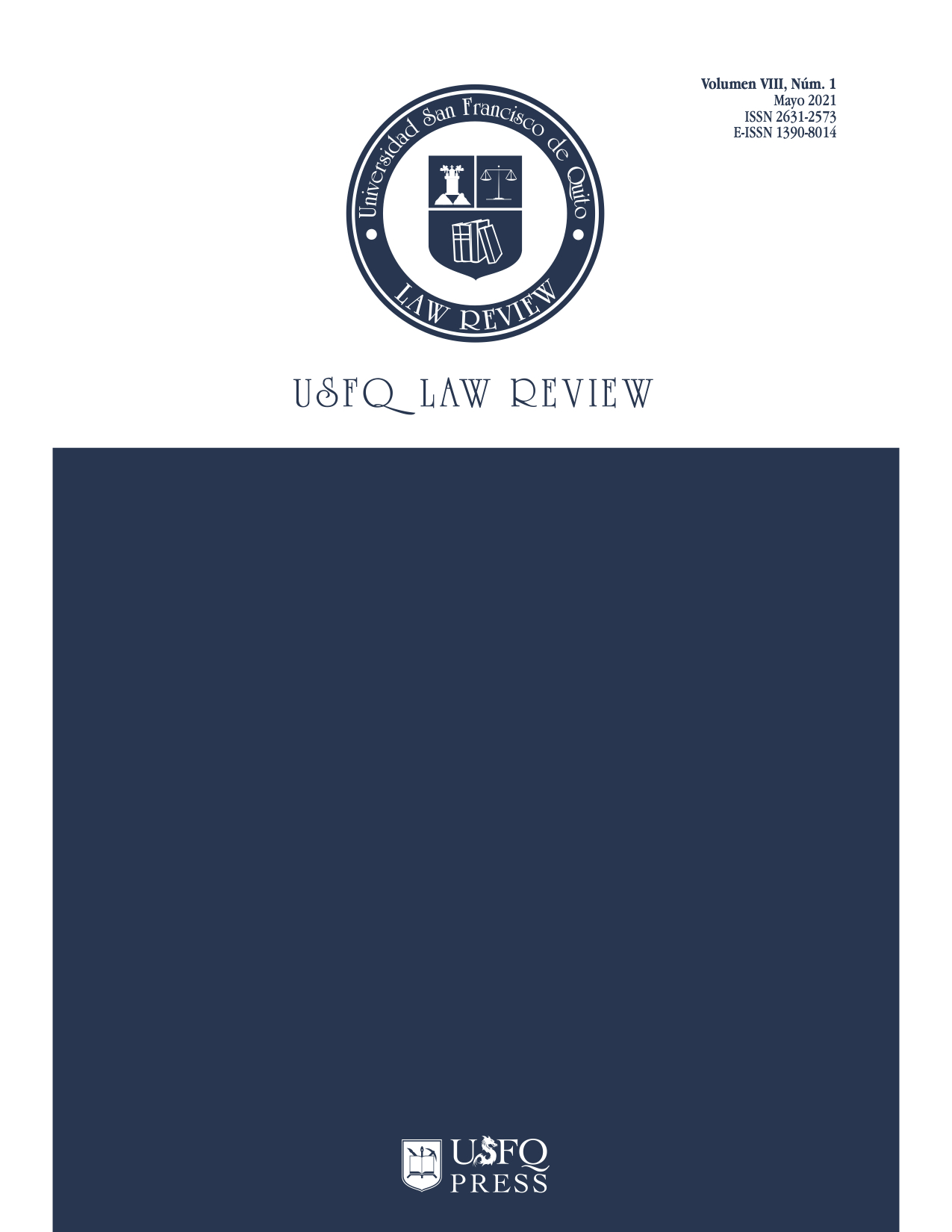Ecuadorian professional football and the mandatory subordination to the Court of Arbitration for Sport
DOI:
https://doi.org/10.18272/ulr.v8i1.2196Keywords:
arbitraje, arbitraje deportivo, consentimiento voluntario, seguridad juridica, resolucion de conflictosAbstract
This legal essay has the purpose of carrying out a national, international, and doctrinal normative analysis, regarding how the Court of Arbitration for Sport (CAS) has the power to resolve controversies in sports matters for Ecuadorian professional soccer teams. This submission to arbitration arises from the compulsory and imposed consent, thanks to the power of international professional football regulatory bodies. For this reason, this type of sports arbitration has been involved in criticism, having lost one of the essential elements for arbitration, consent. This deformation of consent causes the parties to question the powers of the CAS, legal security and even its impartiality. Therefore, it is necessary to understand how an alternative justice has become the only path to access justice in controversies related to football. Consequently, a distorted arbitration is the result, maintaining only its procedural form, but losing its essence.
Downloads
References
Charlotte Peiffer, "RFC Seraing &Doyen Soports V, FIFA: Changing the rules of the game in international sports arbitration?", Working paper N.Y.U Journal of Legislation & Public Policy(s/f).
Código de Arbitraje Deportivo del Tribunal Arbitral du Sport, 1984, Modificado por última vez 01 de julio de 2020.
Código del Trabajo, R.O. Suplemento 167 de 16 de diciembre de 2005, reformado por última vez el 22 de junio de 2020.
Constitución de la República del Ecuador, R.O. 449 de 20 de octubre de 2008, reformado por última vez el 12 de marzo de 2020.
Disposición Complementaria Sexta, DL. Nº 1071, Perú, Congreso de la República, 1 de septiembre de 2008.
Estatuto de la Liga Profesional de Fútbol del Ecuador, R.O. Edición Especial 930 del 22 de mayo de 2019.
Estatuto del Club Deportivo Profesional Independiente del Valle. R.O. Edición Especial 930 de 22 de mayo del 2019.
Estatutos de la Confederación Sudamericana de Fútbol, Congreso Extraordinario de 4 de junio de 2019.
Estatutos de la FIFA, de agosto de 2018.
FIFA, "Financial Report 2018", Fédération Internationale de Football Association, 2019, https://resources.fifa.com/image/upload/fifa-financial-report-2018.pdf?cloudid=xzshsoe2ayttyquuxhq0.
FIFA, "La centenaria historia de la FIFA", Fédération Internationale de Football Association, 2014, https://es.fifa.com/news/die-geschichte-der-fifa-2480045-2480083.
Francisco Javier Béjar Pinedo, "La Eficacia Subjetiva del Convenio Arbitral Estatutario en la Sociedad Anónima", Revista De Derecho Universidad San Sebastián, (2014).
Iñigo de la Maza Gazmuri, "Contratos por adhesión y cláusulas abusivas ¿Por qué el estado y no solamente el mercado?",Revista Chilena de Derecho Privado(2003).
José Carlos Fernández Rozas, "Elementos configuradores de la justicia arbitral", Revista Internacional de Arbitraje (2009).
Joseph L. Daly, "Arbitration: The Basics", Journal of American Arbitration 5 (2006).
Julio César Rivera, "El orden público en el arbitraje", Instituto de Investigaciones Jurídicas de la UNAM (s.f.)
Ley del Deporte, Educación Física y Recreación. R.O. Suplemento 255 de 11 de agosto de 2010, reformado por última vez el 20 de febrero de 2015.
Ley del Futbolista Profesional, R.O. Suplemento 462 de 15 de junio de 1994, reformado por última vez el 14 de mayo de 2001.
Ley Orgánica de Defensa del Consumidor, R.O. Suplemento 116 de 10 de julio de 2000, reformado por última vez el 6 de mayo de 2019.
Liga Profesional de Fútbol del Ecuador, "¿Qué es la LigaPro?",LigaPro EC, 2020, https://www.ligapro.ec/about.
María José Carazo Liébana, El Arbitraje Societario, (Madrid: Marcial Pons, 2005), 50.
Nicolas Rosero Espinosa, "Arbitraje Deportivo: La Experiencia del Tribunal Arbitral Du Sport", THEMIS: Revista de Derecho (2017).
Reglamento a la Ley Orgánica de Defensa del Consumidor, R.O. 287 de 19 de marzo de 2001, reformado por última vez el 21 de marzo de 2006.
Rupprecht Podszun, "The Pechstein Case: International Sports Arbitration versus Competition. How the German Federal Supreme Court Set Standards for Arbitration", Working paper of the Heinrich Heine University Dusseldorf (2018).
Tribunal Arbitral du Sport, Origins, "Arbitration Rules", 2020, https://www.tas-cas.org/en/general-information/history-of-the-cas.html.
Tribunal Arbitral du Sport, Origins, "History of CAS", 2020, https://www.tas-cas.org/en/general-information/history-of-the-cas.html.
Vicente Javaloyes Sanchis, "El régimen jurídico del Tribunal Arbitral del Deporte",Working paper Universitat de Lleida, (2014)
Wendolyne Nava González y Jorge Antonio Breceda Pérez, "Mecanismos alternativos de resolución de conflictos: un acceso a la justicia consagrado como derecho humano en la Constitución mexicana", Cuestiones Constitucionales: Revista Mexicana de Derecho Constitucional (2017)
Published
How to Cite
Issue
Section
License
Copyright (c) 2021 Gabriel Vela

This work is licensed under a Creative Commons Attribution-NonCommercial-ShareAlike 4.0 International License.
In relation to copy rights, authors publishing with USFQ Law Review know and accept its internal policies, including but not limited to:
1. Open Access Policy.
2. Authorship Policy.
3. Copyright Policy.
4. Pre-Publication Policy.
5. Post-Publication Policy.
6. Intellectual Property Protection Policy.
7. Digital Preservation Policy.


